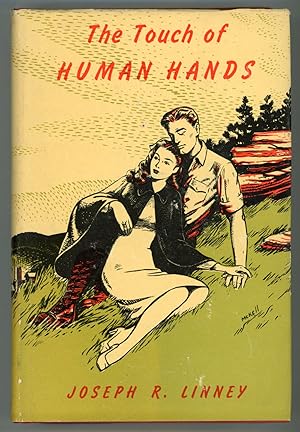LINNEY, JOSEPH R OBERT (1 résultats)
Type d'article
- Tous les types d'articles
- Livres (1)
- Magazines & Périodiques
- Bandes dessinées
- Partitions de musique
- Art, Affiches et Gravures
- Photographies
- Cartes
-
Manuscrits &
Papiers anciens
Etat
- Tous
- Neuf
- Ancien ou d'occasion
Reliure
- Toutes
- Couverture rigide
- Couverture souple
Particularités
- Edition originale
- Signé
- Jaquette
- Avec images
- Sans impression à la demande
Pays
Evaluation du vendeur
-
THE TOUCH OF HUMAN HANDS: A NOVEL .
Edité par Dorrance & Company, Philadelphia, 1947
Vendeur : Currey, L.W. Inc. ABAA/ILAB, Elizabethtown, NY, Etats-Unis
Edition originale
Octavo, cloth. First edition. A novel about life in an Adirondack mining community in the 1920s by a prominent Adirondack mining engineer and ultimately, district manager of the Adirondack properties owned by Republic Steel. "At about the time the first ore was being mined in Lyon Mountain, J. R. Linney was born, in Taylor, Pennsylvania. His father had left the iron mines of England to cross the Atlantic, and his mother's family had been coal miners in Wales. At the age of 10, J. R. Linney began his mining career as a slate picker at a coal breaker near Scranton, Pennsylvania. By 1916 he was superintendent of the Hudson Coal Co. and in February, 1919, he accepted an offer from the Delaware and Hudson Railroad, which by that time owned the Chateuagay Ore and Iron Co., to become manager of its northern New York subsidiary. When Linney arrived in Lyon Mountain, its residents had no running water and no electricity in their houses. As for law and order, they were just as likely to settle a disagreement with a six-shooter as with rational discussion. The town was lawless enough to have forced Mrs. William Hart, the widow of the local justice of the peace, to carry a gun to and from the pool room and barbershop she owned. It was a town of immigrants, of Poles and Lithuanians, of French-Canadians and Germans and Norwegians. Its young American boys were as likely to know the call for dinner in a foreign language as in English. The environment was ripe for improvements, and Linney was prepared to make them. He advanced housing conditions. He made water and electricity available to all. He converted the shoot-'em-up mining town into a lawful and orderly village . In 1939, the Chateaugay Ore and Iron Co. was bought by Republic Steel, the nation's third largest steel producer. Linney was appointed district manager, and had control over the mines in Mineville, Port Henry, and Lyon Mountain. Linney, the man who brought iron mining in the Adirondacks to its peak, died in 1952 in Lima, Peru, while inspecting that country's mining projects. His legacy included two books (A HISTORY OF THE CHATEAUGAY ORE AND IRON COMPANY [1934] and a novel, THE TOUCH OF HUMAN HANDS [1947]), one Adirondack village which he almost single-handedly brought into the twentieth century, and two sons who set North American bobsledding afire with their superior sleds and record-breaking performances." - Tom Anderson, "Iron Shoes," Adirondack Life, February 1980. Plum 7312. A fine copy in nearly fine dust jacket with light wear at edges. (#154668).


